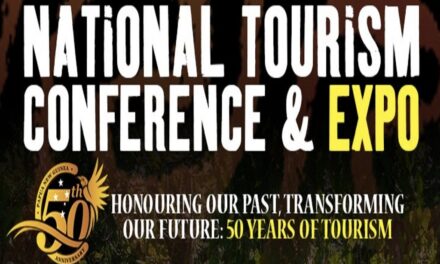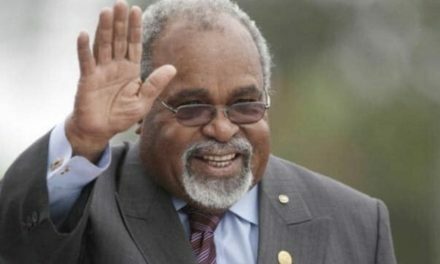The most relevant guide to the potential of a wartime tourism industry in PNG is the continued growth in Australians making the pilgrimage to Gallipoli.
Each year up to 9,000 Australians visit the Dawn Service at Anzac Cove. Thousands more visit it at other times of the year. It is now becoming a pilgrimage for more than a million Turkish people also visiting Gallipoli each year.
Papua New Guinea is the principal custodian of sites sacred to the wartime heritage of Australia, America and Japan.
It therefore has the potential to be a world class wartime tourism destination for pilgrims from each of these countries. The emergence of Kokoda as PNGs most popular tourism destination since the 50th anniversary of the Kokoda campaign in 1992 is a key indicator of this potential.
‘Kokoda’ is almost the complete adventure experience for Australian baby-boomers and young adventurers. It requires physical stamina and mental tenacity. The wartime history evokes strong emotions. The unconditional care and support of local PNG guides and villagers is humbling. The environment is rugged, remote and pristine.
Beyond Kokoda are wartime adventures in Rabaul, Milne Bay, Buna, Gona, Salamaua, Nadzab, Lae, Finchafen, the Finisterre Ranges, Death Valley, Shaggy Ridge, Madang and Wewak. These are not only different battlesites – they are inhabited by different cultures with different traditions that create an adventurous smorgasbord. The 80th anniversary period from 2022 – 2025 will lead to increased numbers of Australians visiting these locations if PNG Tourism develops a wartime tourism strategy to develop and market these significant locations.
Wartime tourism is not restricted to trekkers. It has the capacity for wartime cruises to Port Moresby, Milne Bay, Lae, Madang, Wewak, Aitape, Manus, Rabaul, Bougainville and the Solomon’s. Imagine an Anzac Dawn Service at Owers Corner; a showcase of PNG culture along Ela Beach; a ‘Beating-of-the-Retreat’ at Bomana War Cemetery followed by a 7-day Pacific War Cruise to each of the significant coastal/island battlesites.
The most important challenge for PNG is to develop a sustainable model that can be applied to each area. The development of the Kokoda trekking industry provides a timely opportunity for a case study as the basis for developing such a model for wartime tourism.
Vision
The Governments of Papua New Guinea and Australia have a vision for the development of a wartime tourism industry that includes:
- Adherence to the Commonwealth Principles of Commemoration established in 1917;
- Identification, interpretation and protection of significant battlesites;
- Acknowledgement of the ownership of traditional custodians of the land at each site;
- Respect for the culture of the traditional custodians of the land;
- Protection of the environment surrounding each site;
- Meeting the safety, health and educational needs of tourists and trekkers; and
- Developing the Kokoda Trail as a management model for significant wartime heritage sites throughout PNG.
Guiding Principles
To achieve this vision, the Governments have set down the following guiding principles:
- This is a PNG led, Australian supported joint initiative to support environmentally sustainable wartime tourism development that delivers real benefits to local communities;
- This understanding has been developed within the guiding principles of the PNG – Australia Development Cooperation Strategy 2006 – 2010;
- Partnerships will be built between the two Governments, and there will be a cooperative, mutually determined engagement process with traditional landowners and local communities within the vicinity of significant battlesites in PNG; and
- Papua New Guinea processes and systems (government, community and private sector) will be used wherever possible for new and enhanced services to assist local communities.
Objectives of the Understanding
Economic and social objectives
The Australian Government will work together with the Papua New Guinea Government to assist it in its efforts to achieve:
- An improved standard of living, quality of life, and access to basic services for communities in the vicinity of significant battlesites;
- Improved opportunities for income generation, through the following:
- sharing benefits from wartime tourism through better distribution of visitation fees and development of local income generation opportunities (business and employment);
- improved access to markets (transport) for other income generation opportunities; and
- The preservation of social and cultural values of the communities within and adjacent to significant battlesite areas.
Environmental Objectives
The Governments of Papua New Guinea and Australia will work towards ensuring the impacts of wartime tourism are managed to deliver clear net environmental benefits for local communities.
Management objectives
The PNG and Australian Governments will put in place the necessary resources and structures to develop a management model which provides for professional business systems and ownership of the resource by traditional custodians of the land.
Implementation outcomes and actions
The PNG and Australian Governments will cooperate in developing and delivering practical activities and processes to achieve the broad outcomes listed below. Some activities will proceed immediately, while others will take some time to be designed and implemented.
Significant Wartime Battlesites
The PNG and Australian Governments will work together to ensure wartime tourism delivers real and increasing benefits to landowners and communities of significant battlesite areas through the establishment of effective management arrangements. Particular areas of focus include ensuring visitors fees are transparently managed and deliver benefits to local communities; that tourist visitations are well managed; and that effective landowner consultation processes are in place.
To assist the PNG Government in achieving these outcomes, the Australian Government will provide immediate project management, financial and legal expertise and assistance.
Analysis of potential future benefit streams and livelihoods
The PNG and Australian Governments will identify potential benefit streams and improved livelihoods for landowners of significant battlesite areas through the following activities:
- Assessments to quantify the possible benefit streams for landowners;
- An economic participation study to cover such options as agriculture, food services for visitors and participation in delivering development programs; and
- A tourism benefits study to consider options for tourism-related income generation related to local cultural activities, guides, food service, souvenirs, art and artefacts.
The Kokoda Trail
Working together, the Governments of PNG and Australia will support the sustainable development of the Kokoda Trail as a model for a wartime tourism industry. Outcomes to be pursued include:
- Increased access to safe water, improved sanitation and environmental health for local communities and trekkers, through support for installation and management of water systems and toilets at a range of locations. Implementation will be in line with national minimum standards, with active community participation.
- Functioning elementary and primary schools, in line with national and provincial education policies, and improved access to secondary, technical and vocational education.
- Functioning aid posts providing primary healthcare services, with the Kokoda Rural Health Centre providing secondary health services and support to aid posts.
- Improved access to markets and services, in line with the outcomes of a transport feasibility study to be undertaken.
- Potential village-scale power solutions will be considered as part of additional medium- term program design.
Capacity Building
The PNG and Australian Governments will work jointly towards improving human capacity within key PNG Government agencies to manage the development and delivery of long-term sustainable benefits to landowners. This will be undertaken through the provision of technical and other expert advice.
Implementation
Oversight
Implementation of this Joint Understanding will be overseen by the Minister for Tourism, Arts and Culture and the Australian Minister for Veterans Affairs and supported by whole of Government Taskforces in Australia and PNG. Program review will be undertaken annually by Ministers, with ongoing review by Taskforces.
Resources
The PNG and Australian Governments will mutually determine their contributions to the implementation of the activities and processes above. The Governments will put in place arrangements for ensuring that these activities can be progressed efficiently.
Monitoring
The Governments accept that monitoring will begin at the same time as implementation begins, with a monitoring framework to be developed as part of the design process. The design of the overall program of work from this Joint Understanding for Commemoration will take place within six months. Taskforces will be responsible for annual reporting to Ministers, with more regular oversight by high level officials.
Timeframe
This Joint Understanding for Commemoration will last for two years. The program of work described herein will be reviewed at two years and a second phase (Phase II) of this program mutually arranged. A high-level review in two years’ time will enable the review of this program to be coordinated with the planned wider review of Australia’s current development assistance program to PNG.
Signed in Port Moresby on
Prime Minister Papua New Guinea | Prime Minister Australia |




